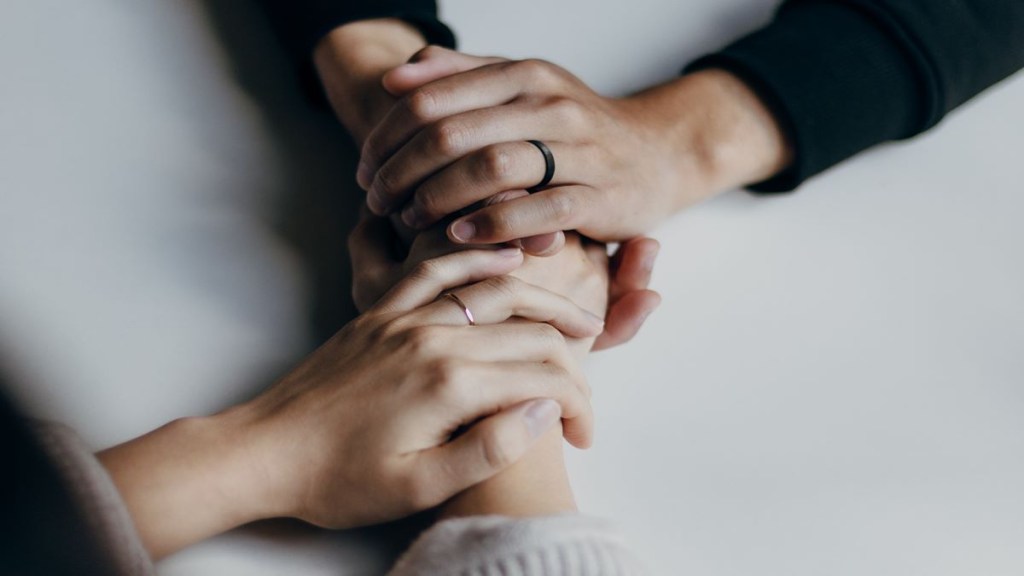Swati, 31, was laid off from her job last year. This comes at a time when she had already gone through two layoffs in recent years. As someone who has also gone through a divorce, this third layoff hit her like a jolt.
“…However strong and positive you are, uncertainty like this triggers everything and makes you question yourself, your capabilities and your entire existence. I have fallen many times and have picked up myself and I know I’ll do it again but it’s okay to feel sad, cry out loud or even doubt yourself. I think when you go through things again and again, you start feeling quite strongly. I’m going through this third layoff in my career after winning awards and getting recognition. I can only say that life is such and it’s okay. I’m becoming more strong with each tide,” Swati told Financial Express.com.
For, Swati, life has never been easy.
“I was in a marriage of 6 years. We were not physical as it was a forceful arranged marriage but we came to terms with it and were just going through life. When you grow up in an orthodox family, you somehow bound yourself by unsaid rules and start living in that bubble. I was married off at the age of 22 to a complete stranger. For me, it was like okay now I’m married, no matter what, this is my life and this is my partner. It’s all the more difficult when you don’t have an understanding relationship with your parents and you can’t share anything with them. I was told and given this life and I was abiding by it,” She said.
However, things took an ugly turn after her marriage.
“My partner and my in-laws started to mentally torture me in order to get rid of me. He started to abuse me both mentally and physically. I kept fighting and asking questions but all in vain. One fine day he told me he was seeing someone and it was like an eye-opener and self-realisation for me. Deep down I knew this was not an ideal marriage but I chose to remain loyal and committed but the same was not reciprocated. I could not come to terms with it,” she added.
For Swati, the major trigger point was when her parents refused to support her
“…they left me on my own only to realise what they were doing with their daughter later on. That’s when I started to have panic attacks and I went into depression,” she revealed.
Unfortunately, Swati isn’t alone.
Women and Mental Health
According to the National Family Health Survey of 2019-2021 showed that an overall 30 percent of women in India face gender-based violence. Consequently, a third of all women in India are at higher risk of developing anxiety disorders and depression.
“Women in India are hesitant to reach out to seek therapy for their mental health disorders because of the fear to find a suitable boy or the fear of not being accepted by their family members and society. On the contrary, men in India are worried regarding the effect it would have on their careers. They fear being labelled as a man who is seeking therapy for their mental health disorder in society. This often stigmatizes mental health and people deter to seek therapy to get their mental health problems treated or even talk about it in public,” Vandrevala told Financial Express.com.
According to a study published in the Indian Journal of Public Health Research and Development, the mental health issues of women are a result various gender-based risk factors like; violence, low income, income inequality, caregiving responsibility, role stereotyping and etc. Meanwhile, mental disorders commonly seen in women are depression, anxiety, somatic complaints and eating disorders.
“The various atrocities faced by women like sexual violence, domestic violence and issues of multiple roles, overwork fairly contribute to mental disorders they suffer from, resulting in poor mental health, it stated.
Moreover, the study also revealed that gender-based violence can cause untold sufferings and permanent damage to one’s emotional and psychological well-being. “Resultantly, women as victims of violence, suffer from emotions despondence and stress, post-traumatic stress disorders, fertility problems and other variants of psychosomatic diseases etc., it revealed.
Reeling under immense emotional and mental turmoil, Swati started questioning her existence.
“My divorce and back-to-back two layoffs. Made me question everything about myself and my existence. No personal stability and no financial stability. And no support. I stopped eating and doing almost any human activity. I just used to cry and used to shut myself in my room for weeks and stay in the dark. Darkness started to feel comfortable as no one could see my vulnerability and I had no human energy or bandwidth to deal with anyone. I just wanted to be left alone as all my life I had only listened to people and did what I was told to. It was never my life. The word ‘Choice’ was not in my dictionary. I lost a lot of weight and even waking up from my bed felt like a task. I was just sinking into that dark hole and that was comforting to me,” she told Financial Express.com.
Mental Health in India
In June last year, the World Health Organization (WHO) released a report that revealed that one in every eight individuals worldwide suffers from a mental disorder. Mental Health disorders are affecting all age groups beginning with autism and cognitive impairment in childhood, depression, anxiety, substance misuse, and psychosis in maturity, and ending with dementia in old life.
The global health agency also revealed that India has one of the world’s largest populations of people with mental issues in one shape or another.
Priya Hiranandani-Vandrevala, Co-Founder, Vandrevala Foundation told Financial Express.com that in over a year, at least one-third of people who called or texted them were struggling with mental disorders like anxiety, depression and suicidal thoughts.
“In addition to this, we observed that 81% of the individuals who reached out to us to seek mental health counseling were from Maharashtra 17.3%, Uttar Pradesh 9.5%, Karnataka 8.3%, Delhi 8 %, Tamil Nadu 6.2%, Gujarat 5.8%, West Bengal 5.4%, Kerala 5.3%, Telangana 4%, Madhya Pradesh 3.8%, Rajasthan 3.6% and Haryana 3.6%,” Vandrevala said.
Launched in 2008 by Cyrus Vandrevala and Priya Vandrevala, the NGO focuses on raising awareness and providing services for emotionally distressed individuals.
“In addition to this, we observed that 81% of the individuals who reached out to us to seek mental health counseling were from Maharashtra 17.3%, Uttar Pradesh 9.5%, Karnataka 8.3%, Delhi 8 %, Tamil Nadu 6.2%, Gujarat 5.8%, West Bengal 5.4%, Kerala 5.3%, Telangana 4%, Madhya Pradesh 3.8%, Rajasthan 3.6% and Haryana 3.6%. As per Indian Council of Medical Research’s (ICMR) recent study, an estimated of 20% of Indian households have a member with any sort of mental disorder. Addressing mental health in India, has some challenges in regards to stigma around mental health conversations, discrimination in accessing mental health support, dearth of skilled mental health practitioners and lack of awareness around mental health disorders and its treatment,” Vandrevala told Financial Express.com.
The WHO estimates that the burden of mental health problems in India is 2443 disability-adjusted life years (DALYs) per 100 00 population; the age-adjusted suicide rate per 100 000 population is 21.1.
“The Governmental push in recognizing the effects of this through the Mental HealthCare Act in 2017 is an important step. It will require a concerted effort from lawmakers, public health apparatus, mass media, and healthcare experts to address this need. The difficulty with accessing quality mental health care is a multifactorial problem. Some of its components are lack of care required at scale, the stigma associated with recognizing mental illness as a disease process, limited awareness in people about mental health and how it can affect everyday life, and suboptimal funding to growing such programs,” Dr Rishi Gautam, Assistant Professor of Psychiatry, The GW School of Medicine & Health Sciences in Washington DC, USA told Financial Express.com.
‘Stigma associated with mental health therapies’
Swati told Financial Express.com after things got unbearably difficult she decided to seek help.
“…My body had already given up and then a little will to live life left in me also started to give up. I cried and cried and called my friends and my sister and asked for help. I consulted a psychologist which was like a rather of fresh air as the first time in my life I felt heard and seen. After completing sessions with her and gaining a little confidence back I got in touch with my life coach who stood by me and guided me through the toughest times both in my professional and personal life,” she told Financial Express.com.
She also said that although her sister was there for her, it took a lot of time of her parents to understand her situation. “This is the love that I always craved. The child in me was aching for it and she finally got it,” she added.
In India, those who are struggling with their mental health often face numerous challenges. According to Vandrevala, Reasons can range from lack of awareness, stigma regarding mental health therapies, family or peer problems or lack of financial stability.
Experts also pointed out that people are hesitant to seek therapy or get professional help.
“Deep-seated traditional & cultural beliefs, societal anxiety, fear to be labelled as a mad person, unable to find a good job or a suitable partner, financial constraints and lack of qualified & skilled mental health practitioners are some of the reasons why people are hesitant to seek clinical counseling in India, she informed.
Moreover, awareness on mental health disorders, their impact on one’s life, and the available support can improve the accessibility to these mental health therapies in India, she added.
“In addition to this, efforts should be made to create a pool of skilled, qualified & experienced mental health practitioners who can provide quality mental health counseling and generate awareness to destigmatize mental health talks in their peers and family members,” she pointed.
Meanwhile, Dr. Gautam revealed that the hesitation in starting therapy or counseling is best addressed by increasing education around mental health at a mass scale or public health level.
Societal role models such as celebrities, sports people, academicians, business leaders and lawmakers can all strongly advocate for reducing stigma and it would be even more impactful if they can share a personal story. People who have recovered from mental illness are great advocates for these treatments as well and should be provided with platforms to air their views,” he told Financial Express.com.
‘Subsidising mental health treatments can improve accessibility in India’
A study, published in March this year, pointed out that on an average, in families who had a member with a mental illness, nearly a fifth of household monthly expenditure is spent on healthcare.
The study, “Catastrophic Health Expenditure and Poverty Impact Due to Mental Illness in India” published in the Journal of Health Management, reveals the financial impact of mental healthcare and the need for financial risk protection for households with members suffering from mental illness.
According to the National Mental Health Survey report, only one in five people with mental health disorders for the past 12 months received evidence-based treatments.
Households from Kerala, Odisha, Arunachal Pradesh, Jharkhand and West Bengal reported the highest prevalence of mental illness per 100 households, as per the study. It is also noteworthy that there is a lack of mental health care professionals in India. Currently, there are roughly 0.75 psychiatrists for every 100,000 patients. Moreover, as a majority of people with mental illness are of the economically productive age group of 19-55 years, this is becoming a contributor to the economic loss of the country. According to WHO, the economic loss due to mental health conditions in India, between 2012-2030, is estimated at $1.03 trillion.
Vandrevals maintains that subsidizing mental health treatments in India can be the one way to improve the accessibility of mental health services in India. “A stronger regulatory framework to have mental health insurance and its strict implementation can make people access mental health therapies. Technology can also play a vital role in providing mental health therapy to the remotest areas. Tele-counseling or digital counseling via WhatsApp will encourage individuals to seek mental health support as per their convenience. It will also maintain their anonymity. As per our data, younger population & women are more comfortable via WhatsApp as it gives them a sense of privacy and it is available 24X7,” she told Financial Express.com.
We need to train more mental health practitioners in India so that a larger number of individuals can receive quality mental health care at a nominal cost, she added.
According to Dr. Gautam, there is an need for increased funding for training mental health experts and this is not limited to Psychiatrists only. This includes clinical psychologists, psychotherapists, mental health counselors, and peer support specialists amongst other disciplines.
“Stronger provisions in the law to ensure mental health conditions are covered by medical insurance and health care providers are reimbursed with parity. Mass media and public health campaigns at national, state, and local levels which focus on the early identification of mental illness. Schools can take the lead by incorporating mental hygiene education in the general health curriculums for adolescents,” he informed.
Despite her struggles, with the help of therapy and her life coach, Swati has develop a positive outlook towards life.
“It’s not that I don’t have setbacks. I again lost my job recently and went into that negative spiral of self-doubt and questioning once again but I pick up and I know I’m much more than a mere corporate job. I have done it before and I will do it again. I’m blessed to have a loving family, friends and now a partner who is there with me. Life is meant to be lived and it’s not as difficult as we make it to be in our heads,” she told Financial Express.com.
DISCLAIMER: If you or someone you know is struggling with their mental health or in distress contact the Vandrevala Foundation’s helpline (+91-9999666555) which is available in 11 languages including English and can be accessed via telephone or WhatsApp 24×7. You can also contact Fortis Hospital’s National Helpline number 91-8376804102 which is available 24×7. You can also contact the Government Mental Health Rehabilitation Helpline ‘KIRAN’ at 18005990019 which is available 24×7.








